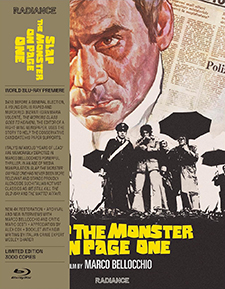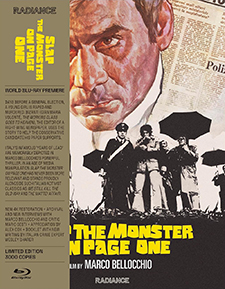Slap the Monster on Page One (Blu-ray Review)

Director
Marco BellocchioRelease Date(s)
1972 (November 19, 2024)Studio(s)
Jupiter Generale Cinematografica/UTI Produzioni Associate/Labrador Films (Radiance Films)- Film/Program Grade: A-
- Video Grade: A
- Audio Grade: A
- Extras Grade: A
Review
Despite its slightly goofy English title (a literal translation of the original Italian), Slap the Monster on Page One (Sbatti il mostro in prima pagina, 1972) is an outstanding, prescient political drama timelier than ever. Part of a trend of ‘70s Italian thrillers about rampant political corruption (Sacco and Vanzetti, Investigation of a Citizen Above Suspicion, Illustrious Corpses, etc.), virtually everything that happens over the course of its story is happening in American mainstream media, right and “left,” today.
In Hollywood movies, editors and reporters in newsrooms of American papers are almost always the good guys, bastions of the First Amendment—not so here. Slap the Monster on Page One impresses from the start, with Gian Maria Volonté starring as Giancarlo Bizanti, the immaculately-dressed editor-in-chief of Il Goirnale (“The Journal”), a widely read Milan daily, lording over staff meetings like Jason Robards’s Ben Bradlee in the later All the President’s Men. When, during a heated election, left-wing extremists firebomb the paper, Bizanti quickly has a photographer ready to snap photos of a rack of burning newspaper pages before calmly having the blaze extinguished. Though the small fire seems limited to a single office and no one is injured, it’s front page news.
Bizanti is no crusading hero like Gene Evans’s Phineas Mitchell in Samuel Fuller’s great, underrated Park Row (1952). Rather, he uses his power to serve Italy’s far-right fascist interests, slanting news stories to demonize immigrants and populist left political parties. When a high school-age girl, Maria Grazia Martini (Silvia Kramar), is brutally raped and murdered, with tacit approval from the police (whose coroner declares the sexually adventurous girl a virgin prior to the rape), Bizanti launches his own parallel “investigation,” framing Mario Boni (Corrado Solari), a student radical who slept with the girl on a couple of occasions, in hopes of using the case to help swing an imminent election.
Slap the Monster on Page One dazzles throughout its fast 87 minutes. Bizanti’s actions are contrasted with talented but naïve new reporter Roveda (Fabio Garriba), Bizanti schooling him on the wording of a headline for maximum right-wing spin. Later Bizanti knowingly sends Rovenda into the lion’s den, a press conference of angry Italian communists protesting Mario’s arrest, aware that Rovenda’s mere association with Il Goirnale puts him in jeopardy, the methodical, Machiavellian editor going so far as to prepare lurid headlines about a brutal beating Rovenda narrowly avoids, much to Bizanti’s disappointment.
In another eye-opening scene, Bizanti returns home to find his wife (Carla Tatò) and teenage son watching a prerecorded interview with Bizanti. When the son expresses admiration for Il Goirnale, Bizanti scolds his wife for the way she’s raising their boy. Anyone trusting his newspaper is an idiot, he says, while hatefully browbeating his own family, repeatedly calling his wife a moron.
Gian Maria Volonté is as much at home here as the well-dressed newspaper editor as he was playing scuzzy Mexican bandits for Sergio Leone. He’s like a male equivalent of Faye Dunaway’s character in Network but even more cold-blooded with an underlying rage ready to surface at any moment.
The film is also a real showcase for Laura Betti, the then-middle-aged actress specializing in neurotic characters in Italian movies big and small, prestigious films by major directors to low-budget exploitation. Here she plays an anti-capitalist Marxist writer and Mario’s sometime lover, he using her for her meager lodgings and what little money she can provide him. Bizanti immediately latches onto her vulnerable psychological state to manipulate her to turn against Mario.
The film began with co-writer Sergio Donati, known for his political Westerns, also directing, but he clashed with Volonté and was replaced by Union of Italian Communists filmmaker Marco Bellocchio, whose aims were more in line with its leading man. It was not, as some have alleged, originally written as a Western; rather, rewritten to incorporate Betti’s character, among other things.
The picture is impressively blunt while never didactic or preachy. Instead, it makes it points so matter-of-factly the complete absence of journalistic integrity is entirely believable and, in noting its similarities to modern news media, most disturbing.
Radiance Films’s Blu-ray utilizes a 4K restoration supervised by the director and done in Italy. The 1.85:1 image is nigh perfect—color, contrast, sharpness, etc. all look superb, as is the uncompressed Italian(-only) mono. (Was an English-language version ever even prepared, I wonder?) The optional English subtitles are excellent and the disc is Region “A” and “B” encoded.
Good supplements consist of an archival interview with director Bellocchio (21 minutes); a video essay/talk by critic Mario Sesti (24 minutes); a 10-minute appreciation by director Alex Cox; and a 20-page full-color booklet featuring an essay by writer Wesley Sharer.
A superb, even searing film more than 50 years old but even more relevant today, Slap the Monster on Page One is highly recommended.
- Stuart Galbraith IV

